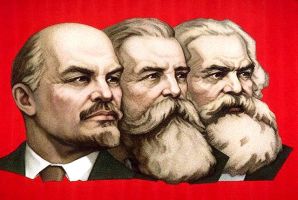Marxism-Leninism is an ideological framework to explain the driving forces of history, particularly class struggle. It was synthesized by Joseph Stalin based on the writings of Karl Marx, Friedrich Engels, and Vladimir Lenin.
It is based on dialectical materialism, the materialist conception of history, and Marxist political economy including the Leninist conception of Imperialism.
After the success of the Russian Revolution and the establishment of the Soviet Union in 1922, many communist parties around the world began to adopt Marxism-Leninism as their political line, and Marxism-Leninism was the main theoretical framework which guided the Korean, Vietnamese, Cuban, Laotian and Chinese revolutions as well as other successful national liberation and revolutionary movements in Africa and Asia.
Today, Marxism–Leninism is one of the theoretical foundations of governing communist parties in China, Cuba, Korea, Laos and Vietnam, and is the political line of many communist parties engaging in class struggle.
Development around the world
Europe
Germany
Soviet Union
Vyacheslav Mikhaylovich Molotov
Georgy Maximilianovich Malenkov
Konstantin Ustinovich Chernenko
United Kingdom
Spain
Alejandro Cao de Bénos de Les y Pérez
Asia
China
Vietnam
Laos
Mongolia
Tuvan
Khertek Amyrbitovna Anchimaa-Toka
Salchak Kalbakkhorekovich Toka
